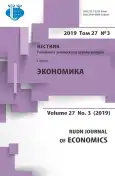The impact of the economic availability of food in Russia on consumption patterns and health of the nation
- Авторлар: Vartanova M.L.1
-
Мекемелер:
- Institute of Social and Political Studies of the Russian Academy of Sciences
- Шығарылым: Том 27, № 3 (2019)
- Беттер: 429-441
- Бөлім: Developed and developing countries economy
- URL: https://journal-vniispk.ru/2313-2329/article/view/342858
- DOI: https://doi.org/10.22363/2313-2329-2019-27-3-429-441
- ID: 342858
Дәйексөз келтіру
Толық мәтін
Аннотация
Currently, Russia is implementing the project “Demography”, which involves the formation of motivation of people to a healthy lifestyle, including a healthy diet. In the article the author reveals the problem of the lack of quality and vital for health products in the daily diet of the majority of the population due to the lack of opportunities to purchase them. Falling incomes and purchasing power of the population shifts the food vector to the consumption of products rich in vegetable fats and sugars or processed products made from inexpensive imported products. High prices for quality products remain the main factor determining the structure of consumption and health of the nation. In this regard, enterprises should start from the regional characteristics both in terms of income levels and dietary habits, and age composition of the target audience, because of the quality of food depends on maintaining the health and longevity of the population and the gene pool of future generations. It is necessary to take measures to promote a healthy diet, create “separate shelves” with natural products, reduce cheating on products, ranging from excise duties to logical costs. Issues of production of environmentally friendly products come to the fore today. In this regard, modern technologies in agriculture are in great demand today, allowing to increase the purity of products.
Негізгі сөздер
Авторлар туралы
Marina Vartanova
Institute of Social and Political Studies of the Russian Academy of Sciences
Хат алмасуға жауапты Автор.
Email: 11marina11@mail.ru
PhD in Economics, researcher of the Center for Eurasian Integration Research
6 Fotievoj St., bldg. 1, Moscow, 119333, Russian FederationӘдебиет тізімі
- Aganbegyan A.G. (2017). Agriculture-locomotive of social and economic growth of Russia. ECO, 5(515), 5–22.
- Aganbegyan A.G. (2017). Overcoming poverty and reducing income and consumption inequality in Russia. ECO, 9(519), 66–84.
- Aganbegyan A.G. (2018). On the way to a civilized market. Bulletin of the Institute of Economics of the Russian Academy of Sciences, (1), 7–26.
- Antyukhina M.I. (2012). Food quality and food security of the Far East (aspects of RussianChinese food trade). Economics of agricultural and processing enterprises, (3), 62–66.
- Federal Service for Surveillance on Consumer Rights Protection and Human Wellbeing. (2019). O sostoyanii sanitarno-epidemiologicheskogo blagopoluchiya naseleniya v Rossiy- skoy Federatsii v 2018 g. [On the state of sanitary and epidemiological welfare of the population in the Russian Federation in 2018]: state report (p. 254). Moscow.
- Khramova M.N., Ryazantsev S.V. (2019). Vozmozhnosti demograficheskogo rosta v RF v usloviyakh regional'nogo neravenstva ekonomicheskogo razvitiya [The possibility of population growth in Russia in terms of regional disparities economic development]. Natsional'nyye demograficheskiye prioritety: novyye podkhody, tendentsii. Seriya: Demografiya. Sotsiologiya. Ekonomika [National population priorities: new approaches, trends. Series: Demographics. Sociology. Economy] (pp. 530–535). Moscow.
- Malaya T.N., Maly A.F. (2017). Some problems of ensuring national food security in the course of creation of the common economic space in the EU and EACC. Vestnik of Lobachevsky University of Nizhni Novgorod, (1), 143–146.
- Meremukov A.S. (2009). Agroyemkost' natsional'nogo khozyaystva i yeye vliyaniya na dinamiku urovnya zhizni [Agricultural capacity of national economy and its impact on the dynamics of living standards]. Vestnik of the Orenburg State University, (2), 68–74.
- Staroverov V.I., Vartanova M.L. (2019). Аgrarian policy of Russia: social reality. Youth. Family. Society (pp. 125–130). Moscow.
- Vartanova M., Osadchaya G., Yudina T. (2018). The national food security of the member states of the Eurasian economic union. Economic and Social Development: Book of Proceedings (pp. 565–571).
- Vartanova M.L. (2018). The use of modern technologies in agriculture as a means of increa- sing productivity and minimizing losses in terms of import substitution. RUDN Journal of Economics, 26(4), 585–597.
- Vartanova M.L., Drobot E.V. (2019). Regulation of digital of financial assets and the use of blockchain technology in agriculture. Creative Economy, 13(1), 37–48.
- Vartanova M.L., Gazimagomedova P.K. (2018). Priority direction of agricultural development: provision of population with domestic production. Food Policy and Security, 5(1), 37–46.
- Zinchenko A.P., Ermakova A.V. (2015). Sovershenstvovaniye struktury sel'skogo khozyaystva RF v protsesse realizatsii gosudarstvennykh programm [Improvement of the structure of agriculture of the Russian Federation in the implementation of state programs]. Doklady Timiryazevskoy sel'skokhozyaystvennoy akademii [Reports of Timiryazev Agricultural Academy], (286–2), 186–187.
Қосымша файлдар









